
Sons of the revolution
Euphoric masses take to streets for second time to depose Islamist leader Morsi, but their energetic optimism is met with hard, violent opposition by pro-Brotherhood supporters; while the army awkwardly hovers over. Eldad Beck, Ynet and Yedioth's special correspondent in Egypt offers live reports from eye of the storm in Cairo
"This is the calm before the storm," a local shop-owner beamed at me. "The storm will come soon, no more than 12 hours in my opinion." What shape would storm take the shop-owner failed to say, but he had no problem hinting at his own political affiliation: "The army's website says that in a little while the air force will perform a flyover above Tahrir, I recommend you find a good spot to watch the show."
Related stories:
- Egypt's Morsi defiantly says he won't step down
- Egypt's Morsi rebuffs army ultimatum, sets own course
- Op-ed: Warning: Egypt may become failed state
The flyover never happened but the shop-owner's prediction regarding the storm was spot on.
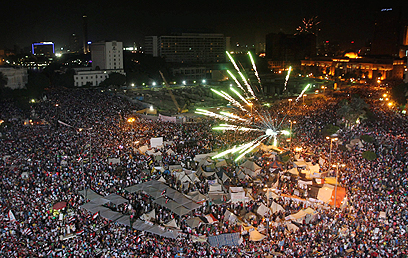
Tahrir. Full again. (Photo: EPA)
As the sun began to set, hundreds of thousands of people began pouring into Cairo's famous square. The protesters, a diverse group of young and old, veiled women and mustached men, children with their parents, were all unified by their opposition to the Muslim Brotherhood manifest in the form of a single emblem worn around their neck – a red note emblazoned with black print letters aimed at Morsi: "Go".
To complete the look, a large number of protesters also donned shirts bearing the name of the uprising movement – "Tamarod," rebellion – next to the image of a tightly clenched fist.
The atmosphere in Tahrir was reminiscent of the one that dominated the famous square some two and a half years ago when protesters took to the street to depose Hosni Mubarak: A noisy ruckus of a festive popular uprising, accompanied with the occasional firework.
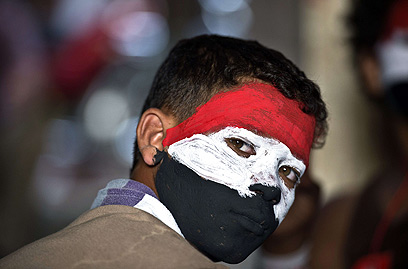
Egyptian retake streets (Photo: AFP)
The opposition is pleased, things are running smoothly: The protests are vibrant, pleasant and even happy. The secular revolution against the Muslim Brotherhood's regime will be remembered not just for the millions who took to the streets, but also for a number of stylish trends which attract media attention and award the protests with images for posterity.
One such phenomenon is the 'Anonymous' masks worn by many protesters, a fad adapted from Western "occupy" protests. These masks, known as Guy Fawkes masks, symbolize opposition to any formal establishment.
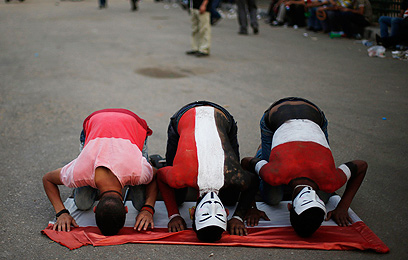
Newest import: Guy Fawkes masks (Photo: Reuters)
Another trend is the neon green lasers colorfully lighting up Tahrir Square. Thousands of protesters armed themselves with laser pointers, and they point them in every which way, especially at the swarm of military and police helicopters hovering over the square and nearby streets.
But as everyone knows, the situation can deteriorate rapidly at any moment, for Morsi's euphoric detractors are not the only ones to take to the streets.
Disappointed and disgruntled
Morsi supports have launched a campaign to fight for their leader's fate; the atmosphere among these crowds stands in stark opposition to the one felt in Tahrir: They are aggressive, violent, walking the streets with clubs and attacking anyone whom they assume to be their enemy, first and foremost Egyptian journalists which they see as enemies of Allah.
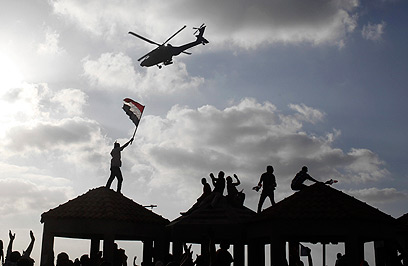
Morsi supporters in Alexandria (Photo: Reuters)
Only Monday, seven people were killed and dozens wounded in violent clashes between pro and anti Morsi protesters in the Giza province.
Monday at 6 pm saw the clock run out on the ultimatum posed by the civilian uprising – a movement comprised of those disappointed and disgruntled by Morsi's first year in power – calling for his resignation. The president, surprisingly, refused to heed their calls.
In response, hundreds of thousands of Muslim Brotherhood supporters consolidated into a number of demonstrations in key locations in Cairo. The offices of the radical Islamist party packed supporters into mini-buses in a bid to reinforce the strength of pro-regime supporters.
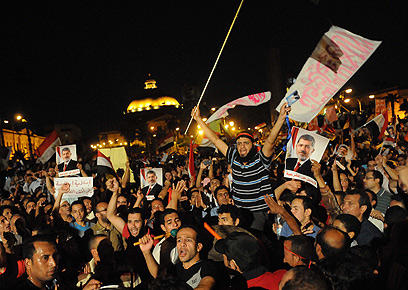
Pro-Morsi rally (Photo: EPA)
But to no avail. By evening the number of Morsi government ministers who had quit their posts in solidarity with the civilian uprising had reached a dozen; the highest ranking of the litter was the country's foreign minister and he was even joined by one of the president's spokesmen.
Army to take the reigns
The US administration has made it crystal clear to its current – albeit seemingly temporary – Egyptian counterpart, that the only way to bring about a peaceful resolution to the uprising is by holding early elections.
Despite mounting national and international pressure, sources close to Morsi blatantly rejected the demand as well as any form of US intervention.
And while opposition protesters picketed outside presidential palace, tension was rising as the end of the army's 48-hour ultimatum neared its end. The fear on everyone's mind: That the situation will deteriorate into a bloody civil war.
Civil and secular opposition figures are placing their faith – possible too much of it – in the army's intervention. They hope that if push comes to shove the army will depose the Brotherhood, "this is the last day of the Brotherhood's regime" the headline of one of the country's leading opposition papers boldly predicted.
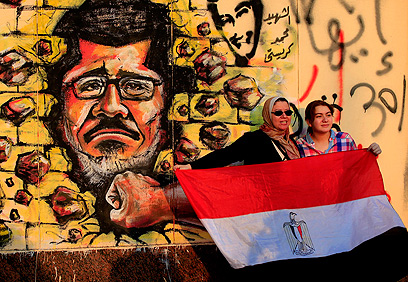
No to American intervention (Photo: AP)
Nevertheless, it seems that the anticipation for a military coup d'état is unrealistic. Egyptian Army Chief-of-staff General Abdel Fattah El-Sisi made sure to publish a road map for bringing about an end to the political turmoil currently plaguing the country.
The cornerstone of his plan is the instatement of an interim cabinet which will be charged with completing the complicated process already in motion of finalizing the country's constitution within a number of months, no small task; in addition to organizing an election for both the presidency and the Shura Council within several months.
Thus, it hopes to answer at least some of the demands set forward by the Tamarod movement. The army, according to El-Sisi's plan, will be charged with supervising the process, and as such, this supervising power will be taken from the civil administrators in a bid to calm the opposition.
In response to the army's road map, the president's office was quick to publish its own plan to resolving the conflict.
Is this what we asked for?
In the meantime, tensions between the two sides are still on the rise. An army vehicle passing by Muslim Brotherhood protests near a central Cairo mosque was attacked by demonstrators, and similar events were reported in number of Egyptian cities, leading to a number of deaths.
Far away from the heart of the protests I meet with Ibrahim and with Halil; both are in their 30s, both secular and employed in Egypt's once bustling tourist industry, but they are deeply divided over their feelings about the Tamarod movement.
"Is this the freedom we wanted?" Ibrahim aggressively protested, "is this the democracy we prayed for? If we'll have a new president, the same people will take to the streets one year from now demanding change, again. Elected representatives need time, this is why the have long terms, they need time to prove they can make good on their promises - or not."
Halil gets upset, "there is no reason to wait any longer," he forcefully determines, "Morsi made a string of promises of which he failed to fulfill. The country is spiraling downwards. Prices are skyrocketing; unemployment is also sky high. From one of the most visited countries in the world in terms of tourism we have sunk to the bottom of the list. Tourists are afraid to come because of the rampant crime and violence prevalent everywhere.
"Enough is enough. Morsi must go!"
Eldad Beck is Ynet and Yedioth Ahronoth's special correspondent in Cairo
- Receive Ynetnews updates directly to your desktop










